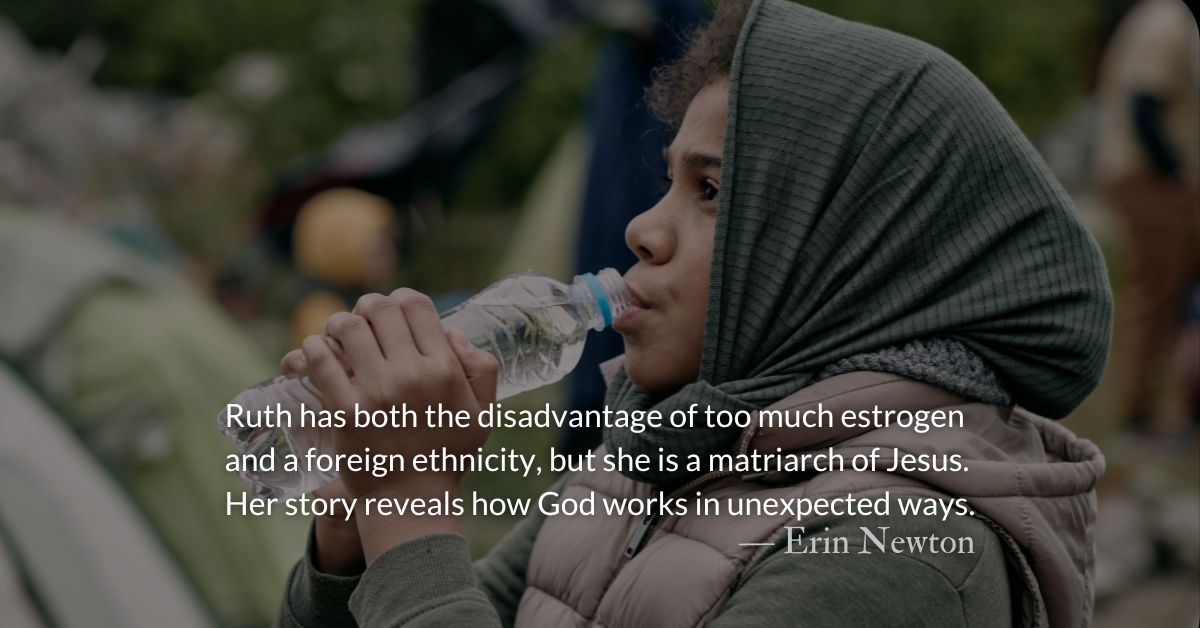Links for today’s readings:
Read: Genesis 38 Listen: (4:24), Read: Mark 15 Listen: (5:16)
Scripture Focus: Genesis 38:26-27
26 Judah recognized them and said, “She is more righteous than I, since I wouldn’t give her to my son Shelah.” And he did not sleep with her again.
27 When the time came for her to give birth, there were twin boys in her womb.
Ruth 4:11-12
11 Then the elders and all the people at the gate said, “We are witnesses. May the Lord make the woman who is coming into your home like Rachel and Leah, who together built up the family of Israel. May you have standing in Ephrathah and be famous in Bethlehem. 12 Through the offspring the Lord gives you by this young woman, may your family be like that of Perez, whom Tamar bore to Judah.”
Reflection: Women Interrupting History
By Erin Newton
The story of Tamar interrupts the narrative of Joseph. It is a jarring interruption at that. The scandalous nature by which the men withhold their duties of levirate marriage and her tactics are both perplexing as well as sordid.
The narrator doesn’t cast much of a critical shadow over the actions. Was such behavior acceptable in the ancient world or did the author simply prefer to focus on the greater purpose of the text (to tell the history of Israel’s genealogy)?
The outcome of Tamar’s plan is clear in the text. She conceived not just a child but twins. In a culture that did not fully grasp the concept of eternal life, “living forever” was generally seen in one’s offspring. Not only was Tamar’s lineage continued but it was doubled, a blessing for this once discarded woman.
Laying aside the ethical questions of Genesis 38, the birth of the two boys is seen generations later as a blessing on par with the offspring of Rachel and Leah.
Once again the question of levirate marriage is in focus in the story of Ruth. The elders of the city speak of Ruth as a blessing for Boaz. She is not marked by her foreign identity or her status as a widow. She is a woman that can bring blessing.
Women are not often named in the Old Testament and even less are they given central roles in the telling of Israel’s history. But the story of Tamar interrupts the narrative and, I think, intentionally.
The next story returns to Joseph but with his own trouble with a scheming woman. Joseph is not like Judah; the reasons for their situations are different. Joseph is portrayed as honorable and full of integrity. Judah is marked as self-serving and untrustworthy. Even the women are seen differently.
The interruption of Tamar’s story calls attention to her. But such attention to foreign women is nothing new in the Old Testament. It is Zipporah, Moses’s wife who rushes out to save their son Gershom. It is Rahab who saved the Hebrew spies. It is Ruth the Moabite who enables the line of David.
The two distinctions that should have placed Tamar outside or on the periphery of the narrative—being foreign and being a woman—are honored by God and highlighted by the narrator.
We serve a God who honors that which the world dismisses.
Divine Hours Prayer: The Refrain for the Morning Lessons
Those who sowed with tears will reap with songs of joy.
Those who go out weeping, carrying the seed, will come again with joy, shouldering their sheaves. — Psalm 126.6-7
– Divine Hours prayers from The Divine Hours: Prayers for Springtime by Phyllis Tickle.
Read more: Tamar’s Story
Tamar is not defined by the abuse she suffered at the hands of men or by her assertive (and questionable) actions…She is a matriarch of Jesus.
Read more: Ruth’s Story
Ruth stands in the spotlight…Boaz redeemed her, but Ruth’s character is the focus…she decided by faith for “your God” to become “my God.”



